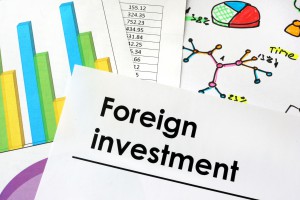In his column in Switzer, John McGrath discusses the future of foreign property investment in Australia.
Here’s what he had to say: 
Foreign investment has been a significant driver of Australia’s property market, and in many ways, a contributing factor to our strong economy, particularly over the past decade as China has boomed and its rising middle and upper classes have looked for new ways to invest in a volatile international economy.
Australia’s attractive lifestyle, clean air and food supply, political and economic stability, high-quality education and health facilities, safe cities, a similar time zone and attractive property market has proven an irresistible combination for our northern neighbours.
According to the latest Foreign Investment Review Board (FIRB) data*, $60.75 billion was invested in Australian residential real estate by foreign buyers in FY2015, up 75% on FY2014^.
The favoured destinations
By far, NSW and Victoria were the favoured destinations, and for the third consecutive year, the lion’s share of investment came from China – and at record levels, too.
Chinese buyers invested $24.35 billion in residential and commercial real estate last year*, almost double that of FY2014^ and more than four times the investment of FY2013#.
In our recently released McGrath Report 2017, we discussed how Chinese appetite for Australian property is clearly increasing, so what happens when governments – Australian and Chinese – tighten controls on foreign investment?
The new taxes
One of the most short-sighted initiatives I’ve seen in my 35 years in real estate is governments imposing hefty taxes on overseas buyers over the past 12 months.
I believe this sends a message that they are not welcome here and that’s not a good image for us on the global stage.
Here’s a rundown of these new taxes:
- In December 2015, the Australian Government introduced fees for foreign real estate acquisitions, starting at $5,000 for purchases below $1 million – which represents the majority of foreign real estate purchases
- In June 2016, the New South Wales Government introduced a 4% stamp duty surcharge for foreign buyers and a 0.75% land tax surcharge from 2017
- In July 2016, the Victorian Government raised their stamp duty surcharge for foreign purchasers from 3% to 7% and announced an increase in the absentee owner land tax surcharge from 0.5% to 1.5% from 2017
- In October 2016, the Queensland Government also introduced a 3% stamp duty surcharge on foreign purchases
And there’s even more hurdles for foreign buyers now, with Australian banks tightening their lending criteria and the Chinese Government limiting the amount of capital exiting the country.
While it’s too early for official numbers, anecdotal evidence from our agents suggests mainland Chinese investors have pulled back, while Chinese clients already here continue to upgrade to new homes and purchase for investment.
The effect of the new fees won’t be fully realised for another 12-18 months, but we think it will be largely limited to the new apartment market. FIRB figures* show about 80% of all foreign purchases are under $1 million – indicating that reduced Chinese demand and settlement defaults will hit the apartment sector most, with some impact also felt in the mid-priced house market too.
As Chinese investment slows down – at least in the short term, FIRB figures show increasing interest from other parts of Asia, primarily Singapore, Malaysia, Hong Kong and Thailand.*^#
We are also seeing an increase in investment from emerging economies such as India, Vietnam and Indonesia.
In our McGrath Report, we also discussed the potential impact of Brexit on our market.
Overall, the Brexit decision should work in our favour. Australia attracts a lot of capital for commercial property and other investments from around the world and we are often competing with Europe for these dollars.
Our residential property market, particularly Sydney, Melbourne and the Gold Coast could benefit as overseas buyers turn away from London, which has been popular with foreign buyers in the past.
However, with Brexit expected to take at least two years, it is hard to predict the ultimate impact.
* Annual Report 2014-15, Foreign Investment Review Board, published April 8, 2016
^ Annual Report 2013-14, Foreign Investment Review Board, published April 27, 2015
# Annual Report 2012-13, Foreign Investment Review Board, published February 28, 2014




No comments:
Post a Comment